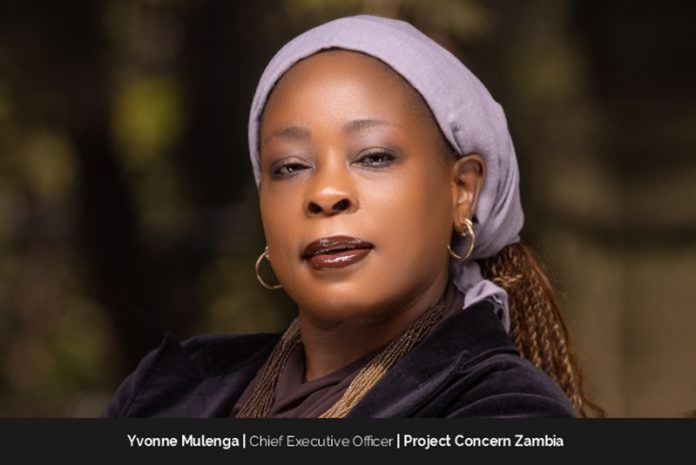
Yvonne Mulenga is a towering and influential figure in Zambia’s public health space. Over the years, she has made significant contributions to the field, thereby helping to transform her country’s healthcare landscape. As CEO of Project Concern Zambia, she is currently living her dream, leading a local NGO that works with the government to implement programs addressing critical issues in her country, such as high poverty levels and high disease burden. Yvonne especially takes pride in leading an organization that is able to help women who are suffering the most and bearing the brunt of disease and poverty. “This, to me, is a success,” she says.
Yvonne values her role in shaping policy and interventions. “I’ve now a seat at the important decision-making table, and I’m also at the table advocating for women’s and children’s rights,” she says. “I can make meaningful contributions, and my voice is heard by important decision-makers—I just look at that as success.”
In her current role, Yvonne provides oversight, ensuring that all the programs of Project Concern Zambia are implemented in line with the obligations outlined in their donor agreements and contracts.
Stepping into the Public Health Arena
An admirer of the broader world of politics, Yvonne’s father wanted his children to be among those who tell stories. So, he pushed Yvonne and her sisters to pursue journalism. This led to Yvonne reluctantly studying journalism in college. She was drawn to one particular module of her journalism course: development studies. “I loved it so much,” she says. “And I thought, ‘This is what I want to do.'”
Yvonne’s career began at the Zambia Institute of Mass Communication in the mid-1990s, during the peak of Zambia’s HIV epidemic. “We saw a lot of deaths. I was also affected, just like everybody else in Zambia,” she shares.
At the institute, Yvonne’s task was to publish a newsletter focusing on health interventions. As no internet was available then, she gathered information from newspaper articles. After compiling all the HIV-related information, she would distribute the newsletter. Once she sent it to an American international NGO, Project Concern International (PCI), which had recently begun operations in Zambia. Their mission involved HIV/AIDS and child survival interventions in the country. The NGO’s country director, after going through her newsletter, offered Yvonne an opportunity to work at her organization as a program assistant.
“I jumped at that because that’s what I’d always wanted to do,” she says. “I joined there as a very young lady in my early twenties as a program assistant. And that’s how my career in public health started. I’ve never looked back since.”
When she looks back, Yvonne believes her interest in public health was inherent. Although the job opportunity in this field came to her almost by chance, she feels this was something she truly wanted to do since childhood. It is primarily because of her mother, who was a nurse. The young Yvonne admired how she handled her work, combined with Christian values such as selfless concern for the welfare and well-being of others.
Yvonne’s childhood memories of her mother’s work as a nurse have left a lasting impression. She recalls seeing her mother not only handling her nursing duties but also taking time to talk with patients, asking about their well-being and families. “People would even come to our home for help,” she says. An older Yvonne realized that what her mother had been doing was similar to the work being done in public health. She explains that it doesn’t end at the biomedical or medical side, where the focus is on individual patients. A public health professional looks at things holistically – health, prevention of diseases, health promotion, community mobilization, and community support. “When I came to learn that about public health in my public health studies and practice, I started falling more and more in love,” she says. “And that’s how my passion for public health began.”
The Upward Trajectory
Within two years, Yvonne rose from the position of program assistant to program manager. She has devoted a major part of her career to PCI. Only once did Yvonne venture outside PCI, and that too briefly. As a new mother to a baby girl, she felt it was time to explore other opportunities. She joined Valid International, a British NGO, as Country Head. The organization focused on integrated malnutrition and HIV work; it had come to Zambia due to high rates of malnutrition and HIV, especially among children. “When that emergency was controlled, Valid decided to move to Nigeria,” Yvonne says. “They wanted to move with me, but I said, ‘No, I want to remain in Zambia.'”
Shortly after, one of her mentors at PCI headquarters, Janine Schooley, she recalls, reached out to her. She asked if she would return to help manage a grant they had received from the US Department of Defense. The project aimed to run HIV/AIDS interventions in the Zambian military, where the HIV prevalence rate was double the country’s average.
“PCI was the first international NGO brave enough to work with the Zambian military to help contain the HIV epidemic in their ranks,” Yvonne says. “So, I took up that challenge.”
“I worked with PCI for the 20 years they were in Zambia, and I ended as their country representative in 2020,” she adds.
The Beginning of a New Chapter
When PCI was exiting Zambia, significant changes were taking place at the global level. The organization was merging with Global Communities and had adopted a localization agenda. Yvonne explains, “In countries where Global Communities had worked for many years and helped to build local capacity, they wanted the staff to start running their own programs.” This transition was being driven by Carrie Hessler-Radelet, President and CEO of Global Communities.
Yvonne recalls Carrie’s crucial support: “She came through, supported me, and linked me to different donors in Zambia, saying, ‘Please support this young woman to run programs.” Yvonne and her team successfully registered as a local entity in 2019. This marked the beginning of a new chapter in her career and for the organization in Zambia.
“That’s how I became Executive Director and then CEO of Project Concern Zambia,” Yvonne says. She considers being the CEO of a local organization and a part of the localization movement a great achievement.
The First Big Grant
We pride ourselves as a “Success Story” of the USAID Localization Agenda and New Partnership Initiative (NPI). After starting off locally led development work in Zambia with an NPI grant from USAID and four years into grant implementation, we have demonstrated that localization can work. We are transforming the theory of change into the real world.
When Project Concern Zambia was getting registered as a local entity, USAID announced a new partnership initiative, seeking to work with new organizations, mainly local partners with no prior experience. Initially, Yvonne and her team were uncertain about their chances. “We thought we weren’t going to make it because we were like, ‘How would USAID entrust this big grant to us as locals to manage?'” she recalls.
Their doubts were dispelled when they reached the concept paper stage and participated in the co-creation workshop. Yvonne remembers that one person from the mission told her, “You did not only submit a competitive concept note, but we also believed in the people behind this, and we believed in you. Now you have this opportunity and this chance to do it.” This opportunity turned out to be their first multi-year, large-scale grant: the USAID Empowered Children and Adolescents Program II (USAID ECAP II).
The grant began in 2020, and they are now in their fourth year. According to Yvonne, it has been quite challenging as well as quite successful. “And we’ve now expanded and added new funding,” she adds.
Facing Challenges in a Patriarchal Society
For Yvonne, working in a patriarchal society, where men have it all, was a major challenge. As program manager, she had to run ten times faster than her male counterparts to do her reports or talk to her donors, and work extra hard on presentations to get noticed by the crowd consisting mainly of men. Yvonne recalls, “I needed to work ten times harder to be recognized.”
According to Yvonne, there were some men, along with women, who supported and cheered her on. She remembers one male American supervisor, Tom Ventimiglia, who gave her a chance: “He’s actually the first one who gave me a dual program management role and said, ‘I know you can do it.'” Eventually, her hard work paid off, and she was made program director.
Later, Carrie recognized Yvonne’s potential. “When Carrie came on, she said, you have been with PCI Zambia in a management job for a very long time, and you’re doing all the right things? Let’s make you country representative because you’ve got it all,'” Yvonne recalls.
Yvonne is successful because she persevered and remains a go-getter. “You soldier on,” she now tells young women she works with. “Sometimes I’m frustrated or just want to break down in a meeting, but I soldier on because I believe in what I’m doing, and I believe in the results I’m seeing,” Yvonne says. “The values that guide my work also help me forge ahead in my work… the values of hard work, respect, accountability, integrity, humility, and equity… I have a strong team that shares these values with me.”
About Project Concern Zambia
Project Concern Zambia envisions a Zambia where the most vulnerable people have the power to lift themselves out of poverty and create healthy lives for their families and communities, both now and in the future. It collaborates with donors, government institutes, and the private sector to achieve this vision, with a particular focus on protecting and nurturing young girls and women.
The organization’s first program, Empowered Children and Adolescents Program II, funded by USAID with support from the President’s Emergency Fund for AIDS Relief (PEPFAR), supports the attainment and sustenance of HIV epidemic control in Zambia.
“Despite Zambia having one of the highest HIV prevalence and incidence rates in sub-Saharan Africa, we are almost reaching HIV epidemic control. But in some subpopulations, such as children and adolescents, particularly adolescent girls, the HIV incidence rates are still high. So, we are not letting the drums roll yet. We still have work to do. Generally, we also need to sustain epidemic control and ensure the epidemic does not resurface. We prioritize HIV prevention and control interventions in all our programs, and we are targeted to reach subpopulations that are lagging, such as children and adolescent girls.”
The program targets several sub-populations, including children and adolescents living with HIV and those exposed to HIV or at elevated risk of HIV acquisition. “Our work focuses on strengthening community/primary health and social protection systems, and we work in collaboration with public primary health care facilities, community social protection programs, and their allied workforce. We strengthen the systems and work through a unified workforce to ensure children and adolescents living with HIV or at risk of HIV acquisition are timely identified, and together with their families, they are timely linked to a comprehensive package of health and socioeconomic services. Yvonne explains. “We care for them to ensure we have an HIV-free generation through a longitudinal case management (LCM) model right in their communities and homes.”
Public health, according to Yvonne, believes in closing the tap by addressing upstream vulnerabilities—for instance, factors that lead young vulnerable girls into risky behaviors that increase their risk of contracting HIV. For example, a young girl is probably engaging in transactional sex to help supplement her household income. Project Concern Zambia identifies these girls, supports their education, and ensures they return to school, stay in school, and progress in their education. By doing so, it helps them avoid high-risk sexual behaviors that put them at risk of HIV. “This is one of the critical subpopulations we focus on in our programs,” Yvonne points out. The other sub-populations they focus on include children and adolescents who are victims of sexual violence. The organization also provides them with mental health support, in addition to ensuring they receive necessary care.
Project Concern Zambia’s ECAP programs are guided by four key domains, called graduation benchmarks. Yvonne explains that once a child/adolescent or family graduates from their program, they want to ensure their health and economic and social status stability of households, protect children from all forms of violence, including sexual violence, and ensure that children receive an education. These benchmarks guide their interventions under the ECAP model, which has proven successful. The model’s success has attracted more donors, providing the organization with the funds to expand into other regions that USAID is not currently supporting but that need support.
Plans for the Future
Yvonne does not intend to remain a lifelong CEO and is already working on a succession plan. “I want to mentor one of the young women I’m working with so that she can take over from me,” she says. “They are good. I can see myself in these women.”
She also wants to see Project Concern Zambia grow into one of the largest local NGOs in Zambia, supported by diverse donors through blended financing. Yvonne aims to work closely with the government to help deliver development programs in Zambia. Although the country is almost reaching HIV epidemic control, Yvonne believes that this is not the end of the story—the ultimate milestone is epidemic control sustenance. She wants Project Concern Zambia to be able to say, “We were part of that success.”
Yvonne looks forward to seeing her organization continue strengthening community and primary healthcare systems, reaching program participants, supporting families to be resilient, and providing opportunities for women.
She hopes to expand economic empowerment programs for women so they can start their own businesses, take care of their families, and break the cycle of intergenerational poverty. By educating young girls, empowering women caregivers, and providing social entrepreneurial skills, Yvonne envisions a future where women can support their families without relying on donor support. “And Project Concern Zambia should be at the center stage doing all those programs,” Yvonne points out.
Message to Aspiring Leaders
Yvonne tells aspiring women leaders to follow their passion and align it with their values. “Let them shape what you’re doing,” she says. She also encourages them to adopt a participatory leadership style, especially working with young women professionals to reach the goals set for the organization. “Focus on things that will help you succeed—such as strong governance, financial management, systems, and policies” is another piece of advice from Yvonne.
“Also, don’t forget about fundraising, especially if you’re coming from the development field,” she adds. “And put in the hard work, engage, listen to your program participants or beneficiaries, and incorporate their feedback into your programming. Make sure you remain accountable throughout the process.”




















